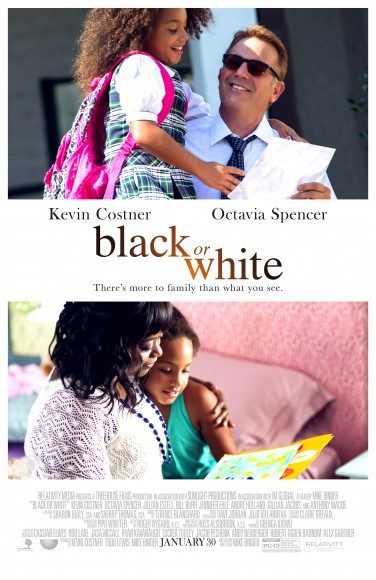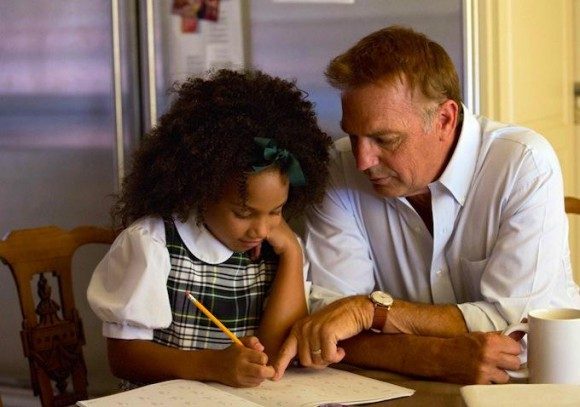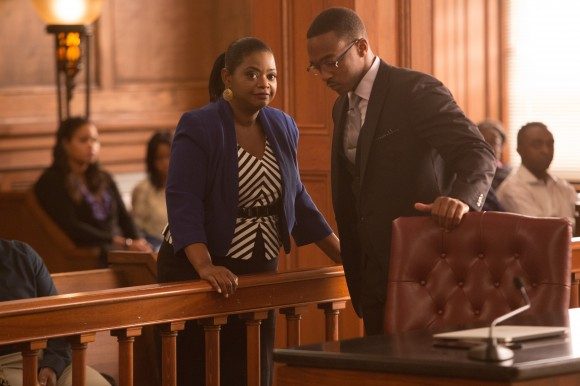

To be honest, whether the child in question identifies as “black or white” isn’t even the central question of the movie. It’s not one that’s really raised at all. She’s little more than the catalyst to other stories, primarily the relationship between her maternal grandfather Elliot (Kevin Costner), paternal grandmother Rowena (Octavia Spencer), and eventually, her absentee father Reggie (Andre Holland). The girl, Eloise, has been raised by Elliot and his wife following the death of their daughter during childbirth, but as the movie begins Elliot’s wife has just died and he’s confronted with the daunting task of raising Eloise on his own while trying to grieve for his wife and maintain a full-time job as a high powered attorney. Rowena wants to make sure that Elliot’s up to the task, is pretty sure that he isn’t, and wants Eloise to come live with her and the extended family that populates Rowena’s house.
That’s a fine premise, but Black or White never seems quite sure where it wants to go from there or why. So there’s a sour relationship between Elliot and Rowena, ostensibly over her defense of Eloise’s father, to which race is just a tacked-on accessory. And there’s the court battle over custody that takes center stage at several points, but ends up mostly irrelevant to the plot. And there’s Elliot’s drinking habit, which is simultaneously used to show how crappy a parent Elliot is and as a diatribe against the evils of alcohol and as a point of comparison to Reggie’s crack cocaine addiction to show how the two aren’t really so different. And there’s questions of racial heritage. And everything gets tossed in with pretty much equal measure, so the conclusion doesn’t really seem to come as a result of deeply exploring any of these fertile tensions, but rather by paying lip service to all of them and choosing a resolution that was available from the get-go.
But all that may be symptomatic of the fact that Black or White lacks a lived in quality. For example, we may presume that Elliot has better than 20 years experience raising girls (17 with his own daughter when she became pregnant, another seven to nine as one of Eloise’s primary caregivers), but early in the movie he’s so patently oblivious to the day-to-day needs and habits of Eloise that it’s patently unbelievable. Elliot may not be a good parent, but it’s hard to imagine he’s as clueless as he’s initially characterized, disconnected by grief or no.
And let’s be clear: Elliot is a very bad parent. We root for him, but the more we see him, the more we realize he’s a drunk who may want the best for Eloise but refuses to take a number of practical steps which will very clearly make him a better (grand)father to her. It’s actually what makes Elliot the most interesting character in the movie. Early on, we’re sure he’s just grieving for his wife and will soon turn things around, but as time goes on we come to realize he’s just not a very good person. Though it’s still lacking any subtlety, the comparison of his socially acceptable “rich man” vices to Reggie’s criminal “poor man” vices is the most incisive of any of the movie’s many themes. Costner, who is also a producer on the movie, is nonetheless an inspired choice for Elliot. He’s charismatic enough that he can never be enough of an asshole for us to stop liking Elliot altogether, but he is undoubtedly an asshole.
Rowena, on the other hand, is too much of a cliché for her own good, and Octavia Spencer finds herself unable to raise the character out of that familiar mold. Rowena is well meaning and sweet, loud, the consummate mother, taking care of sons and daughters, grandchildren, nieces, and nephews by means of a successful entrepreneurial business run out of her garage, all the while nursing a gigantic blind spot for her son’s drug habits. It’s kind of fun watching her get into power struggles with Elliot, but ultimately she’s a lot of bluster and isn’t as affective as the plot deserves.
The Verdict: 2 out of 5
The themes Black or White seeks to address are ones worth exploring, I just wish it had picked maybe two or three and actually made the movie about them instead of using them as window dressing. A movie about race relations, drug addiction, and family tensions needs subtlety of understanding, needs to show all the shades of grey instead of simply enumerating two sides and letting them butt heads. There are some interesting elements at work here, namely the deconstruction of Elliot as our initial protagonist–turned–antihero (or at least something down that path), but Black or White doesn’t make good on any of its promise, leaving every discussion no more than skin-deep.



